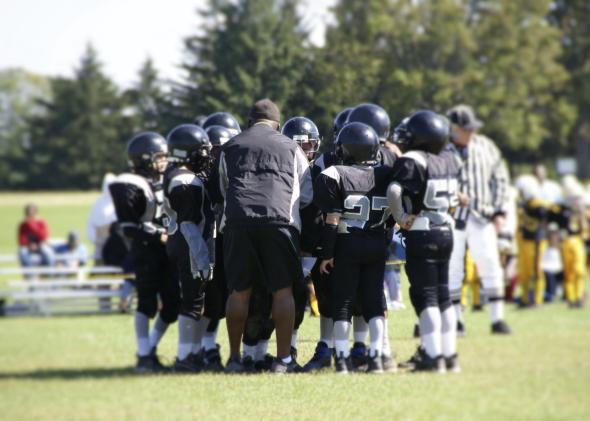
The Greater Game
Despite its risks, football’s values inspire leaders, encourage diversity, and are a catalyst for social change.

Football is “The Greater Game.” It is the game of leaders, from presidents of the United States to CEOs of our nation’s largest and most successful corporations. From successful entrepreneurs to doctors, lawyers, teachers, policemen, firefighters, small business owners, and almost every profession, football has instilled and formed the character of many of our most resilient leaders.
As early as 1899, soon-to-be president Teddy Roosevelt recognized the fledgling sport of football’s importance to building young men in American society. Promoting the “Doctrine of the Strenuous Life,” he argued “that highest form of success which comes, not to the man who desires mere easy peace, but to the man who does not shrink from danger, from hardship, or from bitter toil, and who out of these wins the splendid ultimate triumph.” Football was soon to become society’s greater game, sharpening the skills both players and spectators needed to successfully navigate life.

Presidents who played football include Dwight Eisenhower, John F. Kennedy, Richard Nixon, Gerald Ford, and Ronald Reagan. Eisenhower summed it up: "Morale -- the will to win, the fighting heart -- are the honored hallmarks of the football coach and player. Likewise, they are characteristic of the enterprising executive, the successful troop leader, the established artist and the dedicated teacher and scientist."
These sentiments are shared by the millions of American men who played “The Greater Game,” whether as youngsters, as youth, as young men, or as men. They, as well as their fathers, mothers, sisters, and wives, can speak to football’s value in their personal development and the character of America. They can tell you how football forged the qualities of perseverance, tenacity, leadership, teamwork, integrity, honor, resiliency, respect and sportsmanship. These are the essential elements to a successful life. They are the characteristics every parent desires to see in their children. They are the ingredients of a prosperous and thriving society.
No other American sport galvanizes communities as football does. From the lights across America on Friday nights to the glory of college campuses on Saturdays, to the professional stadiums of Sundays, Mondays and Thursdays, football brings people of all ages, walks of life, creeds, and colors together. It is a game of diversity both on the field and off, where men are identified not by the color of their skin, but the content of their athletic ability and teamwork—the honor and love that they share for their brothers of the gridiron.
“The Greater Game” is a foremost agent of social change in America. Beginning when I played Pop Warner, it was football that taught me not to dislike someone who didn’t look like me. Our teams, our brotherhood, extend beyond the issues that divide society. It is on our practice fields and in our locker rooms and huddles that the self-evident truths of equality and diversity rise above individual interests and the ills of society.
In 2007, the NFL launched its PLAY 60 campaign, designed to tackle childhood obesity by getting kids active through in-school, afterschool and team-based programs, online child-targeted outreach, and many partnerships with like-minded organizations. The NFL’s Breast Cancer Awareness campaign began in 2009. Since then, the NFL has raised nearly $7 million and nearly 10,000 women have received screenings.
Recently, America challenged the NFL to take the lead in addressing domestic violence, sexual assault and child abuse. America looked to football to set the example in saying “No More.” And football rose to the challenge by raising personal conduct standards that protect victims and survivors.
Indeed, there are risks in football. Notwithstanding, football once again is leading the nation in research and development to protect football players of all ages from unnecessary risk. Through nationwide youth outreach, the NFL is teaching better techniques, introducing new technologies, providing wellness education, and promoting rule changes that make football and other sports safer by better protecting the health and safety of the athletes.
The lessons of football—character, leadership, tenacity, and perseverance—are qualities that everyone believes to be important to achieving excellence. The value of football inspires the very things that we want to see in ourselves as we experience life and pursue happiness and success. In a day when some are clamoring that the risk with football is too great, we believe that the risk is far greater to an America without football. It is the greater game for the greater good.
To explore more on the debate about youth football click here.